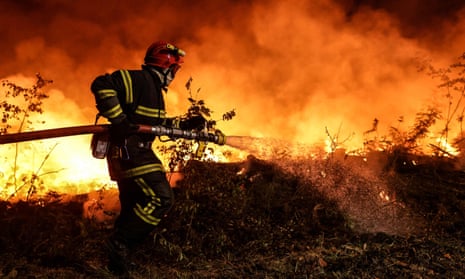Can we talk about it now? I mean the subject most of the media and most of the political class has been avoiding for so long. You know, the only subject that ultimately counts – the survival of life on Earth. Everyone knows, however carefully they avoid the topic, that, beside it, all the topics filling the front pages and obsessing the pundits are dust. Even the Times editors still publishing columns denying climate science know it. Even the candidates for the Tory leadership, ignoring or downplaying the issue, know it. Never has a silence been so loud or so resonant.
This is not a passive silence. It is an active silence, a fierce commitment to distraction and irrelevance in the face of an existential crisis. It is a void assiduously filled with trivia and amusement, gossip and spectacle. Talk about anything, but not about this. But while the people who dominate the means of communication frantically avoid the subject, the planet speaks, in a roar becoming impossible to ignore. These days of atmospheric rage, these heatshocks and wildfires ignore the angry shushing and burst rudely into our silent retreat.
We have seen nothing yet. The dangerous heat England is suffering at the moment is already becoming normal in southern Europe, and would be counted among the cooler days during hot periods in parts of the Middle East, Africa and South Asia, where heat is becoming a regular threat to life. It cannot now be long, unless immediate and comprehensive measures are taken, before these days of rage become the norm even in our once-temperate climatic zone.
The same formula applies to every harm humans do to each other: what cannot be discussed cannot be addressed. Our failure to prevent catastrophic global heating arises above all from the conspiracy of silence that dominates public life, the same conspiracy of silence that has, at one time or another, surrounded every variety of abuse and exploitation.
We do not deserve this. The billionaire press and the politicians it promotes may deserve each other, but none of us deserves either group. They are constructing a world between them in which we have not elected to live, in which we may not be able to live. On this issue, as on so many, the people tend to be far ahead of those who claim to represent us. But those politicians and media barons deploy every imaginable wile and ruse to prevent decisive action from being taken.
They do so on behalf of the fossil fuel industry, animal farming, finance, construction firms, car manufacturers and airline companies, but also on behalf of something bigger than any of those interests: the power of incumbency. Those who hold power today do so by stamping out challenges, regardless of the form they take. The demand to decarbonise our economies is not just a threat to carbon-intensive industry; it is a threat to the world order that permits powerful men to dominate us. To give ground to climate campaigners is to surrender power.
Over the past few years, I’ve begun to see that mainstream environmental movements have made a terrible mistake. The theory of change pursued by most established green groups is entirely wrong. Though seldom openly articulated, it governs their strategy. It goes something like this. There is too little time and the ask is too big to try to change the system. People aren’t ready for it. We don’t want to scare away our members or provoke a fight with the government. So the only realistic approach is incrementalism. We will campaign, issue by issue, sector by sector, for gradual improvements. After years of persistence, the small asks will add up to the comprehensive change we seek and deliver the world we want.
But while they have been playing patience, power has been playing poker. The radical right insurgency has swept all before it, crushing the administrative state, destroying public protections, capturing the courts, the electoral system and the infrastructure of government, shutting down the right to protest and the right to live. While we persuaded ourselves that there is no time for system change, they proved us wrong by changing everything.
The problem was never that system change is too big an ask or takes too long. The problem is that incrementalism is too small an ask. Not just too small to drive transformation; not just too small to stop the tidal wave of revolutionary change rolling in from the opposite direction; but also too small to break the conspiracy of silence. Only a demand for system change, directly confronting the power driving us to planetary destruction, has the potential to match the scale of the problem and to inspire and mobilise the millions of people required to generate effective action.
All this time, environmentalists have been telling people we face an unprecedented, existential crisis, while simultaneously asking them to recycle their bottle tops and change their drinking straws. Green groups have treated their members like idiots and, I suspect, somewhere deep down, the members know it. Their timidity, their reluctance to say what they really want, their mistaken belief that people aren’t ready to hear anything more challenging than this micro-consumerist bollocks carries a significant share of the blame for global failure.
There was never time for incrementalism. Far from being a shortcut to the change we want to see, it is a morass in which ambition sinks. System change, as the right has proved, is, and has always been, the only fast and effective means of transformation.
Some of us know what we want: private sufficiency, public luxury, doughnut economics, participatory democracy and an ecological civilisation. None of these are bigger asks than those the billionaire press has made and largely achieved: the neoliberal revolution that has swept away effective governance, effective taxation of the rich, effective restraints on the power of business and oligarchs and, increasingly, effective democracy.
So let’s break our own silence. Let’s stop lying to ourselves and others by pretending that small measures deliver major change. Let’s abandon the timidity and tokenism. Let’s stop bringing buckets of water when only fire engines will do. Let’s build our campaign for systemic change towards the critical 25% threshold of public acceptance, beyond which, a range of scientific studies suggests, social tipping happens.
I feel clearer about what effective political action looks like than I have ever done. But a major question remains. Given that we have left it so late, can we reach the social tipping point before we hit the environmental tipping point?
George Monbiot is a Guardian columnist

